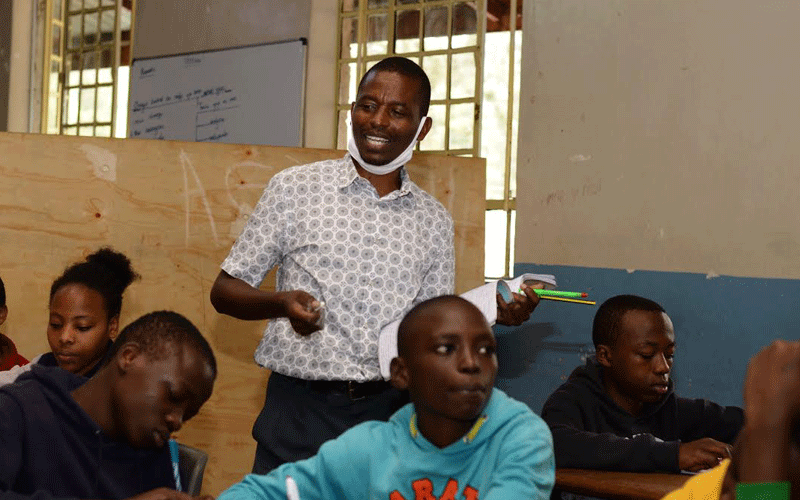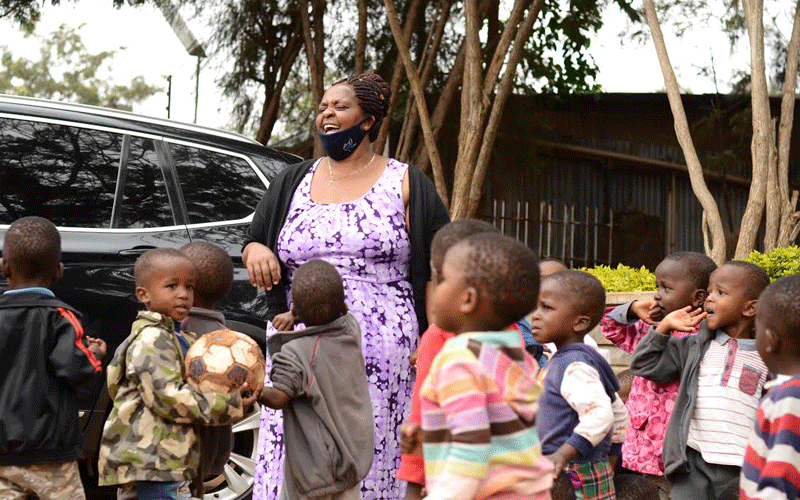Orphans at Kiambu home continue learning despite pandemic
By Wahinya Henry, September 14, 2020The kindergatten toddlers earnestly look at the main gate, which has been locked to keep off unwelcome visitors to their shelter.
From their squatting position, it is as though they are anticipating a special kind of visitor, probably a good samaritan to deliver learning materials as they, unlike other children across the country have been continuing with classes despite closure of schools six months ago, to contain the spread of coronavirus.
Welcome to Mogra Children’s Home located a short distance from Kiambu town, in Muthaiga North.
The reason why they are ‘quarantined’ together at this home is not because the children and their caretakers are ignorant about the coronavirus pandemic.
They have no option, but to stay clamped up together throughout the crisis.
The home operations
The danger the pandemic poses to the children is demonstrated when Reverend Hannah Wairimu Njoroge, the founder of the home makes an entry into the steel gate.
The children break into excitement as they charge towards their ‘mother’. Shrill welcome voices livens the atmosphere as shouts of Mathee… Mathee… Mathee! – sheng for mother, rents the air.
A good number spring to extend their elbow bumps to Rev Wairimu, who responds in similar style, equally happy to see them.

“When schools were ordered closed at the onset of Covid-19, I was caught off guard. I did not know what to do with learners who live in this premise.
They had nowhere else to go,” explains Wairimu, adding, “Here, we are sure of their safety as the 60 plus teachers, social workers and staff are able to observe health guidelines away from the rest of the public.”
The home’s operations manager, Simon Karugu explains that the centre was established to support homeless children from Mogra Star Academy, a free community school in Mathare North in Nairobi who were in the risk of going to the streets.
The school supports more than 1000, but since the pandemic struck some of the children, 410 of them have been staying at the home as they had nowhere to go after the pandemic struck.
“We have been left with the responsibility of keeping the children engaged on a daily basis, and that includes continuing with classes.
So they partitioned a multipurpose hall into classrooms,” says Karugu.
Timothy Kimani, 34 landed at the home at the age of four years, according to the home records.
It’s here that he first attended kindergarten and then proceeded to secondary school and ended up at KCA University to take up in accounts. “Instead of leaving the home.
I chose to stay and assist run the education programme besides other duties at the home,” says Kimani adding, “This place is not like a normal home.
Children learn in a different environment. They come from different backgrounds and are traumatised.”
Wairimu started Mogra Star Academy in the Mathare slums in 1997 for learners at the height of the HIV/Aids pandemic that wiped out parents and left many children without care.
“I lived and ran a shop in the slums and I saw many children roam aimlessly for days with nothing to do after their parents died. Their surviving parents were also too helpless,” narrates Wairimu.
After the post-election violence in 2007, learning was disrupted and the school was forced to host more than 160 orphans, who moved into her homestead.
“Seeing that I could not host all the children in my house, I decided to find another home for them.
Someone offered to give me their one and a quarter piece of land in Kiambu and Mogra Children’s Home was founded,” Wairimu recounts about the history of the home.
The genesis
But she faces a myriad of challenges, “We have tried to use what we have, but we don’t know for how long it will take; we need to prepare for the long-term, but we also need funds to put those detailed measures in place,” says Wairimu, “We need learning materials, food and other needs for the learners and the rest who do not attend class,” she adds.
The fear that the children may go without needs haunts her. “The number of well-wishers and philanthropists has shrank since the outbreak of the pandemic.
Some able students at the school used to pay school fees. Now there is no fees to support those in need,” she says.
Warimu is appealing to the national Covid-19 fund to also consider the welfare of orphans and destitute children.
